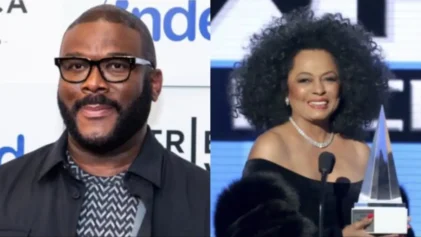In the garb of an erotic thriller, Tyler Perry’s new Netflix movie is a convoluted mess, unsure of what it wants to be. It starts in one direction, takes a detour, loses control, and then crashes to a screeching halt.
Full of the prolific filmmaker’s signature flourishes, it gets ridiculously silly with each passing minute. So that by the time it teeters close to the end of its two-hour runtime, it gets outrageous to the point of no return.

But good things first. “Mea Culpa” stars five-time Grammy winner Kelly Rowland in arguably her meatiest role yet. She is Mea Harper, a criminal defense attorney, one of the absolute best, we’re told, who decides to take on the high-profile case of a famous painter named Zyair Malloy (Trevante Rhodes), accused of brutally killing his Mexican girlfriend of six months. Rowland gives the role her all, even if the film continues to get increasingly loopy. In her hands, Mea is authoritative and commanding; she stands tallest in the room at any given point, and yet Rowland makes her vulnerable, transparent enough for you to feel her turmoil.
Written, directed, and produced by Perry, the film opens at a marriage counselor’s office, an effective device that instantly establishes Mea’s failing relationship with her husband Kal (Sean Sagar). He is an anesthesiologist who was fired for showing up to work high and drunk. Mea has been running the house and sustaining him for a few months now, one of the central reasons why she agrees to represent Zyair, despite the media already pronouncing him guilty and the thorny detail that Kal’s elder brother Ray (Nick Sagar), a district attorney, is on the sparring side.
Mea’s marriage is broken enough for her to hire Jimmy, a private investigator, played by RonReaco Lee, who also happens to be her old pal. Lee is the film’s brightest spot. “Mea Culpa” could have benefitted immensely from using him more. It’s plain sad that Perry chooses not to. Another thoroughly underutilized talent in this film is Shannon Thornton as Charlise, Ray’s wife and Mea’s only friend in the family. Though she is crucial to the film’s plot, it’s ludicrous how little she gets to do.
As the seductive, shady celebrity artist, Rhodes gets a lot of screen time. But despite provocative lighting, a rousing background score, and a long-drawn buildup, his portrayal of Zyair is painfully dull, outright flat. It’s a classic case of miscasting, almost a cautionary tale. His performance is so one-note you wouldn’t believe he is the same man who played the adult Chiron in Barry Jenkins’ heartbreaking “Moonlight” (2016).
Moreover, he has no chemistry with Rowland. So even when the goings-on get progressively graphic — there’s a prolonged slow love-making scene with their taut, naked bodies greased and gyrating in paint — the effect is naught. “Mea Culpa” will remind you of “Jagged Edge” (1985) in the way its protagonist, a lawyer, gets infatuated with her client. It also gives a hat-tip to “Fatal Attraction” (1987) in the unusual amount of time and weight it gives to the freight elevator to Zyair’s love condo.
The movie is the newest addition in a long line of films that peddle problematic Perry politics. With “Mea Culpa,” Tyler takes forward his single-minded obsession with punishing Black women for not giving in or wanting more from life. “A Fall from Grace” (2020), “Meet the Browns” (2008), and “I Can Do Bad All By Myself” (2009) are just a few examples.
If in “A Fall from Grace,” the lead character Grace gets swindled, cheated on, and incarcerated for desiring a second chance at love and getting married to a younger man, in “Mea Culpa,” Mea is constantly belittled by her crocodile of a mother-in-law (a histrionic Kerry O’Malley), told what to do, and is almost killed. Moreover, the entire idea of who is culpable is so warped in the film. Forget now, it would have been considered regressive even 50 years ago.
Both Netflix and Perry can do much better than this.


